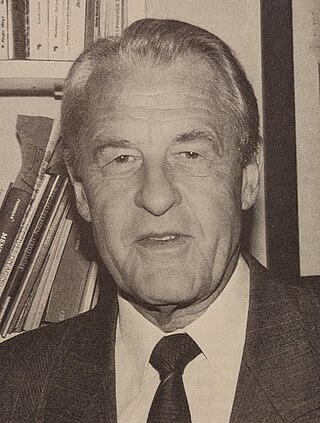Professor Andreas Gestrich (born 3 July 1952) is a German historian who was director of the German Historical Institute London from 2006 to 2018.
Professor Andreas Gestrich (born 3 July 1952) is a German historian who was director of the German Historical Institute London from 2006 to 2018.
Gestrich was born on 3 July 1952. He studied from 1973 to 1979 history, Latin and Russian at the Free University of Berlin and at the Universities of Tübingen and Bristol. In 1979 he completed his studies with the first state examination for teaching at grammar schools in the subjects of history and Latin. Instead of teaching, Gestrich became a research assistant to a DFG project on the social history of childhood, youth and family at the Institute of Education at the University of Tübingen. In 1983 he moved to the University of Stuttgart, where he habilitated in 1992.
From 1992 to 1997 Gestrich held substitute professorships in Würzburg, Karlsruhe and Trier. Since 1997 Gestrich has been professor of modern history at the University of Trier. In September 2006 he became director of the German Historical Institute in London. [1]
His research interests include the history of the family, childhood and youth, the history of poverty and poor relief, media history and the social history of religious groups. [1]
In February 2006, Gestrich was awarded the Order of Merit of Rhineland-Palatinate. In August 2018, he was awarded the President's Medal of the British Academy "for his contribution to the study of German and Continental European History". [2]

Rolf Rendtorff (1925–2014) was Professor of Old Testament at the University of Heidelberg from 1963 to 1990. He was one of the more significant German Old Testament scholars from the latter half of the twentieth-century and published extensively on various topics related to the Hebrew Bible. Rendtorff was especially notable for his contributions to the question of the origins of the Pentateuch, his adoption of a "canonical approach" to Old Testament theology, and his concerns over the relationship between Jews and Christians.

Peter Lampe is a German Protestant theologian and chaired Professor of New Testament Studies/History of Early Christianity at the University of Heidelberg in Germany.
Glenn Warren Most is an American classicist and comparatist originating from the US, but also working in Germany and Italy.

Andreas Dorschel is a German philosopher. Since 2002, he has been professor of aesthetics and head of the Institute for Music Aesthetics at the University of the Arts Graz (Austria).
Friedrich Wilhelm Karl Ritter von Hegel was a German historian and son of the philosopher Georg Wilhelm Friedrich Hegel. During his lifetime he was a well-known and well-reputed historian who received many awards and honours. He was one of the major urban historians during the second half of the 19th century.

Rebekka Habermas was a German historian and professor of modern history at the University of Göttingen. Habermas made substantial contributions to German social and cultural history of the 19th century. She held visiting positions at universities in Paris, Oxford, Montreal and New York City, among others.
Georg Gerson Iggers was an American historian of modern Europe, historiography, and European intellectual history.
Olaf Blaschke is a German historian. His research has focused on the modern and contemporary periods. Several of his more substantial publications have involved the Roman Catholic church.

Norbert Finzsch as Norbert Rollewitz is a German historian.
The Göttingen Faculty of Theology is the divinity school at the University of Göttingen, officially denominated the "United Theological Departments" but commonly referred to as the "Theological Faculty" . It was instituted at the foundation of the University, in 1737, along with the three other original faculties of Law, Medicine, and Philosophy. Over the centuries, the Göttingen Faculty of Theology has been home to many influential scholars and movements, including the rise of historical criticism, Ritschlianism, the History of Religions School, and Dialectical Theology. Its members were also involved in the Göttingen school of history.
Heide Wunder is a German historian.
Martin Staehelin is a Swiss musicologist and university lecturer.
Josef Ehmer was an Austrian historian and professor emeritus at the University of Vienna.
Rudolf Vierhaus was a German historian who mainly researched the Early modern period. He had been a professor at the newly founded Ruhr University Bochum since 1964. From 1971, he was director of the Max-Planck-Institut für Geschichte in Göttingen. He became known for his research on the Age of Enlightenment.

Jens Hacke is a German political scientist and author.
Barbara Vogel is a German historian.
Hans Medick is a German historian.
Horst Weigelt is a German Protestant theologian. From 1975 to 2002 he was Professor of Historical and Systematic Theology at the Otto Friedrich University of Bamberg. His research focuses on the Reformation, Pietism and Enlightenment in the early modern period. He has also written specifically on Schwenkfelders.
Alfred Bammesberger is Professor Emeritus of English and Comparative Linguistics at the Catholic University of Eichstätt.
Hartmut Lehmann is a German historian of modern history who specializes in religious and social history. He is known for his research on Pietism, secularization, religion and nationalism, transatlantic studies and Martin Luther. He was the founding director of the German Historical Institute Washington DC and was a director of the Max Planck Institute for History. He is an emeritus honorary professor at Kiel University and the University of Göttingen.